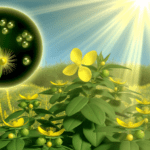Menopause is a natural biological process that marks the end of a woman’s reproductive years, signifying the permanent cessation of menstruation. Typically occurring between the ages of 45 and 55, menopause is diagnosed after a woman has gone 12 consecutive months without a menstrual period. The transition into menopause, known as perimenopause, can bring a variety of symptoms due to the body’s adjustment to decreasing levels of estrogen and progesterone. These symptoms may include irregular periods, vasomotor symptoms (hot flashes and night sweats), vaginal dryness, chills, sleep disturbances, mood changes, weight gain, and changes in hair or skin texture.
The Importance of Natural Management Strategies
While hormone replacement therapy (HRT) has been a common treatment for menopause symptoms, many women seek natural management strategies due to concerns about the potential risks associated with HRT, such as increased risk of certain cancers and cardiovascular issues. Natural symptom management focuses on lifestyle changes and remedies that can alleviate symptoms without the need for synthetic hormones. These strategies can empower women to take control of their menopause experience with fewer side effects and a holistic approach to their overall health.

If you wonder, if this discomfort and the dryness down there will be there forever….
Try Mae. Mae is gives you back comfort, control, re-assurance, and re-connecting.
Mae is more than just a vaginal moisturizer; it’s your ally for intimate natural health, rediscovering joy, cultivating comfort, and even igniting sparks of intimacy and rekindled romance. Mae is your companion in rejoicing in your femininity at every stage of life. Learn more…
Overview of Natural Ways to Alleviate Menopause Symptoms
There are several natural ways to manage menopause symptoms effectively. Nutritional strategies involve optimizing intake of calcium and vitamin D for bone health, maintaining a healthy weight, and increasing consumption of fruits and vegetables. Identifying and avoiding trigger foods that exacerbate symptoms is also beneficial. Lifestyle modifications such as regular exercise, staying hydrated, reducing refined carbs and sugars, and maintaining regular meal patterns can significantly improve symptoms. The role of protein is crucial in preventing muscle mass loss and aiding in weight and mood regulation. Phytoestrogens, found in certain foods, can mimic the effects of estrogen in the body and may offer relief for some women. Additionally, evaluating the use of natural supplements like black cohosh, soy, and flaxseed, which have been associated with symptom relief, is important. However, it is essential to consult with a healthcare provider before starting any supplements due to potential side effects and interactions with other medications.
Nutritional Strategies for Menopause Symptom Relief
Calcium and Vitamin D for Bone Health
During menopause, the risk of osteoporosis increases due to hormonal changes that can weaken bones. Calcium and vitamin D are essential for maintaining bone health. Dairy products like yogurt, milk, and cheese, as well as green leafy vegetables such as kale and spinach, are rich in calcium. Tofu, beans, and sardines are also excellent sources. For those who may not get enough from their diet, calcium-fortified foods can be beneficial. Vitamin D, which is synthesized by the skin in response to sunlight, is crucial for calcium absorption. With age, the skin’s ability to produce vitamin D decreases, making it important to consume vitamin D-rich foods like oily fish, eggs, and fortified products, or to consider supplementation.
Maintaining a Healthy Weight
Gaining weight is common during menopause, and excess body fat, particularly around the waist, can increase the risk of heart disease and diabetes. Studies have shown that women who lose weight during menopause may see a reduction in symptoms such as hot flashes and night sweats. Maintaining a healthy weight through a balanced diet and regular physical activity is therefore not only beneficial for symptom relief but also for disease prevention.
The Role of Fruits and Vegetables
A diet abundant in fruits and vegetables can help alleviate menopause symptoms. These foods are low in calories and high in nutrients, aiding in weight management and disease prevention. They may also contribute to bone health, with studies indicating that a diet high in fruits and vegetables is associated with less bone breakdown. Including a variety of colorful fruits and vegetables in your diet is a natural way to combat menopause symptoms while boosting overall health.
By the way, something for you, a little gift!!!
I am just in the middle of publishing my book. It’s about How women can balance their hormones. One part is about food and diet, of course.
Follow this link and enter your email.
I will send you this part of the book for free once the book is published. It has many concrete, practical tips and recipes and will help you feel better during menopause or times of Big hormonal fluctuations.
Annette, Damiva Lead for Health & Wellness

Identifying and Avoiding Trigger Foods
Certain foods and drinks can exacerbate menopause symptoms like hot flashes, night sweats, and mood changes. Common triggers include caffeine, alcohol, sugary, and spicy foods. Keeping a symptom diary can help identify personal triggers. If specific foods or beverages seem to worsen symptoms, reducing consumption or avoiding them altogether can provide relief. It’s important to listen to your body and adjust your diet accordingly to manage symptoms effectively.
Lifestyle Modifications to Ease Menopause Symptoms
The Impact of Regular Exercise
Engaging in regular physical activity is a cornerstone of managing menopause symptoms. Exercise not only helps in maintaining a healthy weight, which is crucial during this period of hormonal change, but it also contributes to improved mood, reduced stress, and better sleep quality. Activities such as walking, swimming, yoga, and strength training can be particularly beneficial. These forms of exercise support cardiovascular health, which is especially important as the risk of heart disease increases after menopause. Moreover, weight-bearing exercises are known to strengthen bones, helping to combat the increased risk of osteoporosis associated with menopause.
Staying Hydrated to Combat Dryness
Menopause can lead to dryness, particularly of the skin and vaginal tissues, due to decreased estrogen levels. Drinking adequate amounts of water—about 8 to 12 glasses a day—can alleviate these symptoms. Hydration helps maintain skin elasticity and can also reduce bloating. Additionally, water intake is essential for weight management, as it can increase the feeling of fullness and boost metabolism, potentially aiding in weight loss.

From unhappy, dry, and sandpaper to silky, smooth and feeling good. That’s Cleo. Cleo is a 100% natural labial balm to moisture and soothe “your other lips”. Cleo is chemical-free, water-free, pH optimized and helps maintain and restore your delicate labial skin’s natural flora. Ideal for daily use or as needed. Get the most silky, lovable lips ever.
Reducing Refined Carbs and Sugars
Diets high in refined carbohydrates and sugars can exacerbate menopause symptoms such as mood swings and energy fluctuations. These foods can cause rapid spikes and dips in blood sugar levels, leading to feelings of fatigue and irritability. To maintain stable blood sugar and improve overall well-being, it is advisable to limit the intake of processed foods and opt for whole grains, legumes, and other complex carbohydrates that provide sustained energy.
The Importance of Regular Meal Patterns
Consistency in meal timing can play a significant role in managing menopause symptoms. Irregular eating patterns can worsen symptoms and make weight management more challenging. Structured meal times help regulate the body’s internal clock, contributing to better sleep and hormone balance. Including protein with meals can also prevent muscle mass loss, which is common during menopause, and support a healthy metabolism.
In conclusion, lifestyle modifications such as regular exercise, staying hydrated, reducing intake of refined carbs and sugars, and maintaining regular meal patterns can significantly ease the symptoms of menopause. These natural strategies not only help manage menopause-related changes but also contribute to long-term health and well-being.

Common chemicals can hurt your gut health, your skin health, your mental health, and immune system.
Do you know the three main ways that your body gets in touch with harmful chemicals?
Knowledge is Power!
The Ultimate Detox Guide will tell you how to lower your exposure to harmful chemicals!
The Role of Protein in Menopause Symptom Management
Preventing Muscle Mass Loss
One of the significant challenges during menopause is the loss of muscle mass, a condition known as sarcopenia. This natural decline can lead to decreased strength, mobility issues, and an increased risk of falls and fractures. Adequate protein intake is crucial for preserving muscle mass, especially during menopause when hormonal changes can accelerate muscle loss. A balanced diet that includes high-quality protein sources such as lean meats, fish, eggs, dairy products, legumes, and nuts can help combat this issue. Regular consumption of protein throughout the day is recommended to ensure a steady supply of amino acids, the building blocks of muscle, to the body.
Protein’s Effects on Weight and Mood Regulation
Protein plays a vital role in weight management during menopause. High-protein diets have been shown to promote satiety, reduce overall calorie intake, and increase metabolic rate, all of which can contribute to maintaining a healthy weight. This is particularly important as weight gain is common during menopause and can lead to increased health risks such as heart disease and diabetes.
Beyond its impact on weight, protein intake has been linked to mood regulation. The amino acids found in protein-rich foods are precursors to neurotransmitters that influence mood, such as serotonin and dopamine. Ensuring adequate protein intake can help stabilize mood swings and improve overall emotional well-being during menopause.
In conclusion, incorporating sufficient protein into one’s diet is a natural strategy to address some of the symptoms associated with menopause. It can help prevent muscle mass loss, aid in weight management, and contribute to mood stability. Personalizing protein intake based on individual needs and lifestyle, along with regular physical activity, can make a significant difference in managing menopause symptoms effectively.
Phytoestrogens and Their Effects on Menopause Symptoms
Understanding Phytoestrogens
Phytoestrogens are a group of naturally occurring compounds found in plants that can exert estrogen-like effects in the human body. They belong to a larger class of compounds known as plant sterols and stanols. Phytoestrogens can bind to estrogen receptors and have the potential to either mimic or modulate the action of the hormone estrogen, which plays a significant role in the reproductive system and is one of the primary hormones that diminish during menopause. This reduction in estrogen can lead to various symptoms such as hot flashes, night sweats, mood swings, and bone loss.
Food Sources of Phytoestrogens
Phytoestrogens are found in a variety of foods, with some of the richest sources being:
- Soy products: Including tofu, tempeh, soy milk, and edamame
- Seeds: Especially flaxseeds and sesame seeds
- Nuts: Such as almonds and walnuts
- Legumes: Including lentils, chickpeas, and various types of beans
- Whole grains: Such as oats, barley, and quinoa
- Fruits and vegetables: Particularly berries, carrots, and apples
It’s important to note that the phytoestrogen content in these foods can vary based on factors such as the method of food processing and preparation.
The Debate Over Phytoestrogens and Health
The health effects of phytoestrogens, particularly concerning menopause symptoms, have been the subject of much debate. Some studies suggest that phytoestrogens can help alleviate menopausal symptoms, such as hot flashes and night sweats, and may offer protective effects against osteoporosis and heart disease. The consumption of phytoestrogens is often cited as a reason for the lower incidence of menopausal symptoms in populations that have a diet high in these compounds, such as in certain Asian countries.
However, the efficacy and safety of phytoestrogens are not universally agreed upon. Critics argue that the estrogenic activity of phytoestrogens could potentially stimulate the growth of hormone-sensitive tissues, leading to health concerns. Moreover, the impact of phytoestrogens can be complex, as they can act as both estrogen agonists and antagonists, depending on the existing level of hormones and the specific type of estrogen receptor they interact with.
Most experts agree that consuming phytoestrogens as part of a balanced diet, particularly from whole food sources, is likely safe and can be part of a natural approach to managing menopause symptoms. However, the use of phytoestrogen supplements or highly processed foods with added soy protein is more controversial and should be approached with caution. As with any dietary change or supplement, it is recommended to consult with a healthcare provider, especially for individuals with a history of hormone-sensitive conditions.
Evaluating Natural Supplements for Menopause Relief

Bette 100% All-Natural Relaxing Lavender Body Lotion.
Chemical-Free
Your relaxing night time body moisturizer to leave the day’s stress behind. Decompress and wish your body good night with the calming scent of lavender.
Common Supplements and Their Efficacy
As women navigate the transition through menopause, many turn to natural supplements to alleviate symptoms such as hot flashes, night sweats, and mood swings. Among the most commonly used supplements, evening primrose oil has shown promise. A study in the Archives of Gynecology and Obstetrics found that daily intake of 500 milligrams could reduce the frequency of hot flashes by nearly 40%. Similarly, flaxseed, rich in omega fatty acids, has been linked to a reduction in menopause symptoms and improved quality of life, according to research in Menopause and Biomedicine and Pharmacotherapy.
Black cohosh and red clover, both containing phytoestrogens, have been widely used for their potential to mimic estrogen in the body, offering relief from vasomotor symptoms. However, their effectiveness varies, with some studies reporting significant benefits and others showing minimal impact. Phytoestrogen-rich supplements like soy isoflavones have also been studied, with mixed results regarding their ability to decrease hot flashes and improve cardiovascular health.
Safety and Effectiveness of Herbal Remedies
While herbal remedies offer a natural approach to symptom management, safety remains a concern. For instance, dong quai, used in traditional Chinese medicine, has been associated with improved sleep quality and reduced hot flashes when combined with other herbs. Yet, its potential carcinogenic effects warrant caution. Black cohosh, despite its popularity, has been linked to gastrointestinal issues and liver problems, emphasizing the need for medical consultation before use.
Herbs like wild yam and maca have been credited with psychological benefits and hormonal balance improvement, but these claims require further substantiation through rigorous clinical trials. The use of valerian root and lemon balm for sleep disturbances has shown positive outcomes, but again, more research is needed to fully endorse their widespread use.
The Need for Further Research on Supplements
Despite the growing popularity of natural supplements for menopause relief, there is a pressing need for further research. Many studies suffer from small sample sizes, short durations, or lack of control groups, leading to inconclusive results. The medical community calls for larger, long-term, randomized controlled trials to establish the efficacy and safety profiles of these natural remedies.
Moreover, the interaction of supplements with conventional medications and the long-term health implications of their use remain poorly understood. As such, healthcare providers and patients must engage in open dialogue about the use of natural supplements, weighing the potential benefits against the risks and uncertainties.
In conclusion, while natural supplements offer hope for symptom relief during menopause, they should be approached with caution and used under the guidance of a healthcare professional. Personalized treatment plans that consider individual health profiles, preferences, and risks are essential for safe and effective menopause management.
Conclusion: Integrating Natural Remedies into Menopause Management
Throughout this article, we have explored various natural strategies that can help alleviate the symptoms of menopause. These strategies encompass a range of nutritional adjustments, lifestyle changes, and the inclusion of specific proteins and phytoestrogens in the diet. Additionally, we have examined the potential benefits and considerations of incorporating natural supplements into menopause management.
Personalizing Menopause Management
It is important to recognize that menopause is a highly individual experience, and what works for one woman may not be effective for another. Therefore, personalizing menopause management is crucial. Women are encouraged to monitor their symptoms, experiment with different natural remedies, and consult healthcare professionals to tailor a plan that suits their unique needs. It is also essential to consider any pre-existing health conditions and potential interactions with other medications when choosing natural remedies.
Menopause as a Natural Life Transition
Menopause is a natural phase of life, and approaching it with a sense of acceptance and empowerment can make a significant difference in a woman’s experience. By utilizing natural ways to manage menopause symptoms, women can support their bodies through this transition with minimal reliance on pharmaceutical interventions. Embracing menopause as a natural life transition can also encourage a more holistic view of health, where lifestyle and dietary choices play a pivotal role in overall well-being.
In conclusion, integrating natural remedies into menopause management offers a complementary approach that can enhance quality of life during this transition. With a focus on personalization and a holistic perspective, women can navigate menopause with confidence and comfort.








